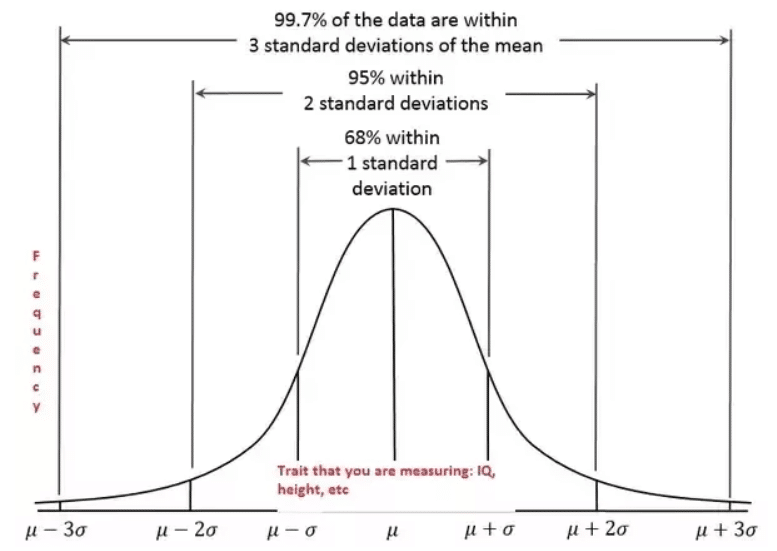If you are like most people, you must’ve wondered if you are weird. What a contradiction, right? Most people? Why would you be weird if you really are like most people?
Ah wait… this is confusing. Let’s break down the problem a bit.
Have you wondered if you are normal?
Have you wondered if you are a weird person?
Do you want to be normal?
Do you want to be different?
The crazy thing is that the answer to all those questions is YES. We are going to see why. It’s plain logic.
What are the chances that you are actually like most people (normal) on traits like height, weight, IQ, vocabulary, walking speed, goals, ambitions, wealth, lovers, academic success, salary, medical conditions, skills, typing speed, etc. ?
Context: I am Assuming that being weird or different is a 5 in 100 chance. As per a normal distribution of any variable that is a trait like height or weight, let us say that normal is being in the 95% category. So for the sake of this answer, Normal is within 2 standard deviations. Here is a normal distribution:

Most people are in the center by definition. That is, normal on some measurement.
The statistical likelihood of you being normal and weird
Let us start listing traits:
Height, weight, walking speed, breathing speed, Intelligence, Voting preferences, Attitude toward space travel, emotional intelligence, age of losing your virginity, punching strength, etc. The list can go on. What are the chances that you are normal in some of them?
Let’s find out.
0.95 (95%) is the probability that you are ‘normal’ on 1 trait. This is the same as 95 people out of 100 are normal. Refer to the previous chart of the normal distribution. We have defined that being like 95 people out of 100 is normal.
2 traits? That is 0.95*0.95 = 0.9025 that’s 90%, sounds ok. So the chances of you being normal on 2 things are 90 in 100. Or conversely, the chances of you being weird are just 10 out of 100.
3 traits? That is 0.95*0.95*0.95 = 0.8573 that’s almost 86%, still sounds like a normal average regular person.
5 traits? That is 0.95 raised to 5 which is = 0.77 that’s 77%, the chances that you are normal on 5 traits is dropping.
10 traits? That is 0.95 raised to a 10. We multiply 0.95 to itself 10 times. Now you get 0.59, that’s 59%. The chances you are normal on 10 traits is just under 60%. That means the chances of you being weird are 40%. Oh boi, ain’t you weird? 🙂
But we aren’t defined by just 10 things, hundreds and thousands of such variables go into making us who we are…. humans with social, physical, personal, spiritual, mental aspects.
Let’s see what are the chances of you being normal in a 100 traits.
0.95 raised to a 100 = 0.0059! That is just under 0.6%, Now you are certainly less normal. The chances of you being different/weird are 99.4%!!!!
But, 100 traits is still too small. You have peculiar likes and dislikes. You have food preferences, ice-cream preferences, song preferences, sexual preferences.
You have languages you know. You have different levels of articulation in each of those. You have an accent. You have a set of books you’ve read which impacted you. You see how being normal is getting difficult by the second?
Now let’s be nice. Weird is not a derogatory term. I really mean unique. Pass no judgment and you are unique.
At 265 human traits/features, the chance of you being normal on all of them is 1 in a million! See how rare you could be in spite of being normal in those traits?
So here is a fun statistic: You are 1 in a million even when you are ‘normal’ in 265 things that define you! Share on XWhen we look at one thing, everyone seems normal, when we look at many things, no one seems normal. The idea of what is weird and what is normal is almost unrealistic!
None of us are really normal, being ‘normal’ is super rare! Happy feeling Unique!
So yeah, you are weird:) Stay that way.
P.S. This post makes 2 assumptions which roughly counteract each other.
- All traits are independent of each other. Which is fundamentally wrong because sometimes one trait predicts the other. Example: vocabulary and articulation in speech.
- If you take all sorts of correlations and see their distribution, it is likely to be normal. #Meta This is an untested assumption.

Hey! Thank you for reading; hope you enjoyed the article. I run Cognition Today to capture some of the most fascinating mechanisms that guide our lives. My content here is referenced and featured in NY Times, Forbes, CNET, and Entrepreneur, and many other books & research papers.
I’m am a psychology SME consultant in EdTech with a focus on AI cognition and Behavioral Engineering. I’m affiliated to myelin, an EdTech company in India as well.
I’ve studied at NIMHANS Bangalore (positive psychology), Savitribai Phule Pune University (clinical psychology), Fergusson College (BA psych), and affiliated with IIM Ahmedabad (marketing psychology). I’m currently studying Korean at Seoul National University.
I’m based in Pune, India but living in Seoul, S. Korea. Love Sci-fi, horror media; Love rock, metal, synthwave, and K-pop music; can’t whistle; can play 2 guitars at a time.



























